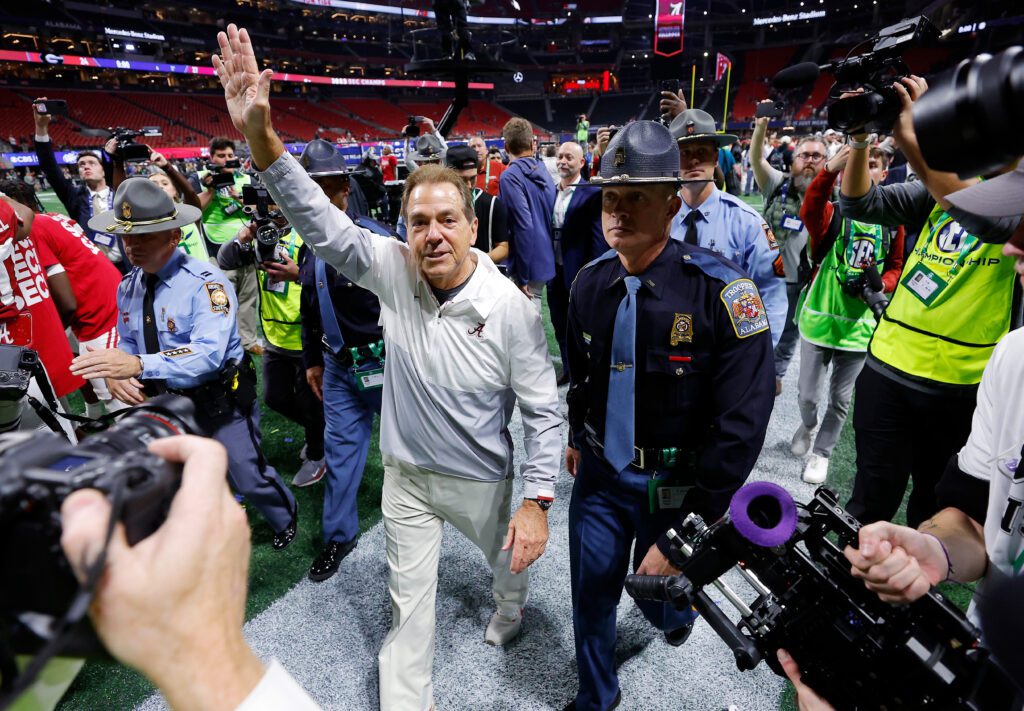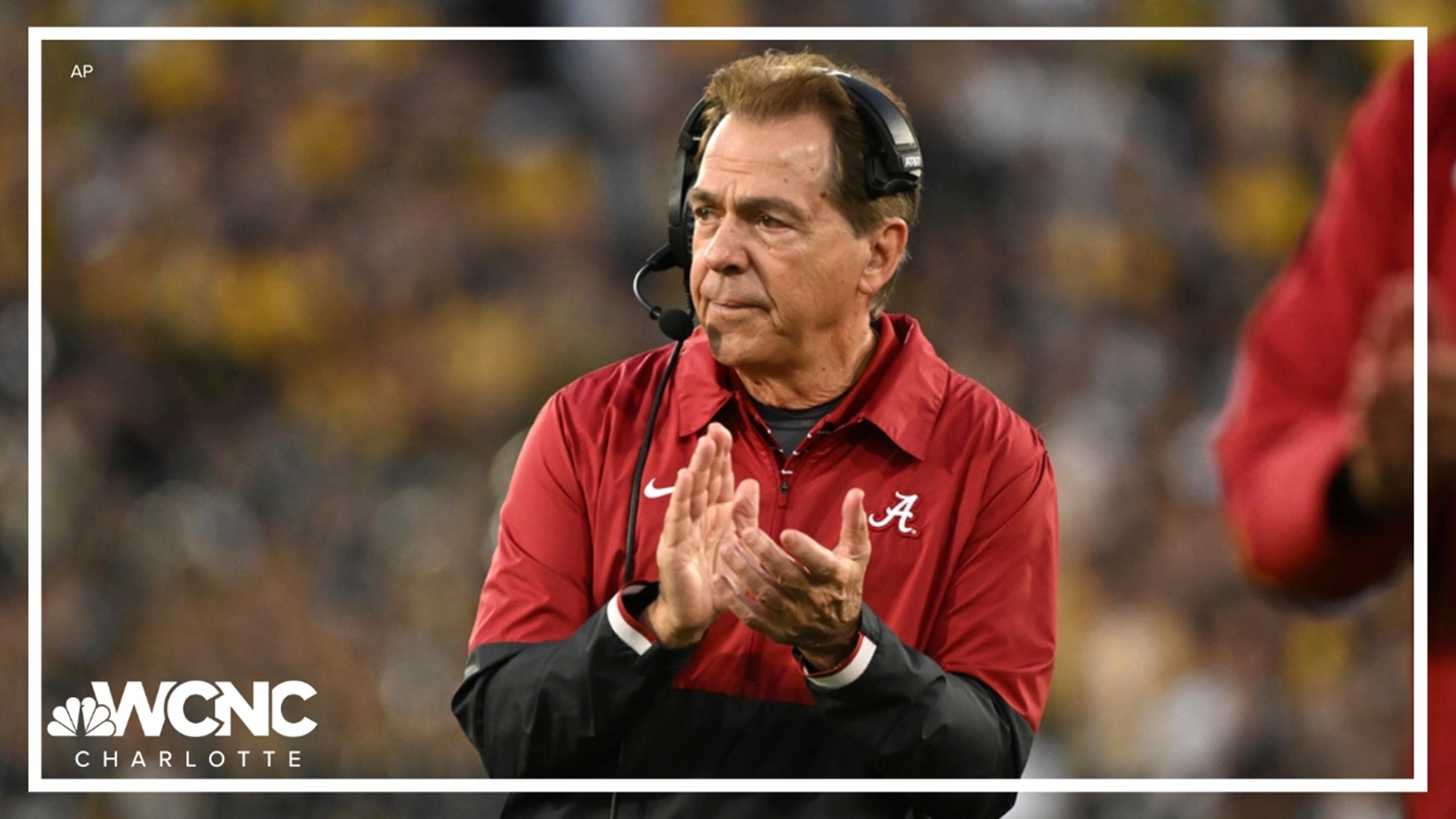College football loses an all-time great coach as Nick Saban retires


The college football world was shaken when legendary Alabama Crimson Tide coach Nick Saban unexpectedly announced his retirement after 17 highly successful seasons in Tuscaloosa.
Saban’s decision to step down came as a surprise, considering the 72-year-old had just signed a contract extension in 2022 that was meant to keep him coaching through 2030. But in a statement, Saban explained that after much thought, he felt the time was right to retire from the relentless demands of being the head coach at Alabama.
“The University of Alabama has been a very special place to Terry and me,” Saban said. “We have enjoyed every minute of our 17 years being the head coach at Alabama as well as becoming a part of the Tuscaloosa community.”
Saban leaves Alabama with a record of 201-29 over 17 seasons, delivering six national championships to match the total won by legendary coach Paul “Bear” Bryant. He revitalized a stagnant Crimson Tide program into the dominant force in college football again, going 12-2 in his first season in 2007 after Alabama had gone 7-6 the year prior.
What followed was the greatest extended run by any college football program in the modern era. Saban’s Alabama teams won at least 10 games every season from 2008 to 2022, dominating the SEC and regularly earning #1 rankings and College Football Playoff appearances. The Crimson Tide were the gold standard that every other elite program measured themselves against.
Now Alabama is tasked with moving on from the man who made them kings again in college football. Athletic director Greg Byrne will be conducting a search for a new head coach after Saban’s exit.
“While his time as our coach may have come to an end, his legacy will live on forever,” Byrne said. “What an honor it has been for us to have a front-row seat to one of the best to ever do it.”
The shock around the college football world after Saban’s announcement was palpable. He had given no indications that he was considering retiring, energetically recruiting new players for the program and staying intensely engaged in Alabama’s day-to-day operations.
But sources close to Saban say he had grown increasingly dismayed with some of the seismic shifts happening in the sport, from the transfer portal free agency to NIL endorsement deals used to entice recruits. Saban saw the foundation of program-building beginning to erode, straining his old-school philosophy.
Some thought the 72-year-old coach could go another 5 years or more at Alabama while maintaining the program’s championship standard. But Saban decided 2022 was the right time to walk away, on his own terms after adding another SEC title.
Saban leaves Alabama in far better shape than he found it in when he was hired away from the NFL’s Miami Dolphins in 2007. The program had faded from national prominence in the decade after Bryant retired in 1982, Recording just three 10-win seasons during that span and struggling to seriously compete for national championships.
Saban’s arrival returned Alabama football to its prior glory days. His “process” built juggernaut teams loaded with future NFL draft picks, particularly on the defensive side. Alabama became the place the nation’s top recruits dreamed of playing for a chance to win championships and improve their pro stock under Saban’s tutelage.
Saban finishes his career with a record seven national championships in the poll era, surpassing Bryant. Combined with his 2003 BCS title at LSU, Saban retires with more major national championships than any coach in college football history.
He also proved he could adapt and change with the times when needed to keep Alabama ahead of the curve. When uptempo spread offenses became the rage, Saban embraced the downfield passing game more. The presence of brilliant offensive coordinators like Lane Kiffin and Steve Sarkisian fueled Alabama’s ability to light up scoreboards while still playing physical defense.
Of course, Saban’s impact stretched far beyond just the results and accolades. Dozens of assistants and support staffers under Saban have gone on to earn head coaching jobs, including Georgia’s Kirby Smart, Texas’ Steve Sarkisian, and Oregon’s Dan Lanning. Nearly 50 of his Alabama players have been selected in the first round of the NFL Draft.
Saban was never able to capture the same magic in the NFL, going 15-17 in two seasons with the Miami Dolphins from 2005 to 2006. But he found his perfect home at Alabama, reviving a sleeping giant into the most dominant force the sport has seen in decades. For that, Saban will be remembered as one of the greatest coaches in college football history.
Now the attention turns to who will replace the legend. Alabama athletic director Byrne faces the tall task of finding someone capable of following Saban without withering under the pressure. Will he choose one of Saban’s proteges like Sarkisian? Or perhaps a hot up-and-coming coach like Tennessee’s Josh Heupel?
Byrne indicated Alabama will conduct a swift but thorough coaching search. Saban’s suggestion is the school promotes from within and elevates a current member of his staff into the head role to maintain program continuity. But Byrne will keep his options open.
Whoever takes the reins will have massive shoes to fill. Saban brought Alabama football back to the pinnacle of the sport, accomplishing things in the modern era that few believed possible. The Crimson Tide went from dormant giant to Goliath under his watch.
But Saban also rebuilt Alabama the right way. He avoided major NCAA trouble during his tenure like his predecessors did. His players graduated. As demanding and intense as he was, the program avoided the cultural problems that plagued others.
For 17 seasons, Saban made sure Alabama football dominated the right way. The Crimson Tide won more games and titles than any program in the country since his arrival, with no end in sight before Saban’s sudden retirement.
It is almost impossible to overstate Saban’s achievements at Alabama. What he built there ranks among the greatest dynasties and runs in college football history. The Crimson Tide are the modern gold standard that rivals all chase.
That is the daunting legacy the new Alabama coach inherits. But Saban also showed it is possible to maintain thatCut standard after Bryant’s passing. He laid out the blueprint.
There will never be another Nick Saban, just as there is only one Bear Bryant. But Alabama now faces life after Saban, determined to keep its standing atop the college football mountain after his retirement.
Saban is confident he has left Alabama football in a strong position going forward. The foundation and infrastructure he built should sustain continued success. But there is no question his departure leaves a major void.
“Hopefully we have done that, and we will always consider Alabama our home,” Saban said.
The college football world enters a new era without arguably the greatest coach in the modern game stalking the sidelines. Saban went out on top, leaving Alabama at the summit yet again.
It will likely be some time before we see another run of dominance like Saban’s anytime soon. But the legacy he leaves behind at Alabama will be timeless and unmatched.










